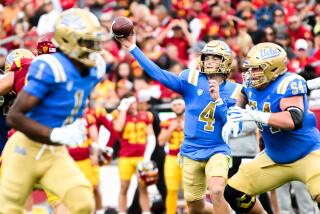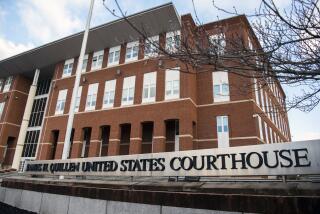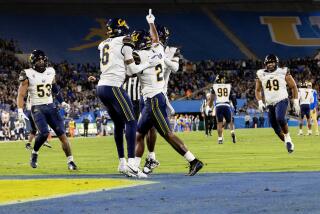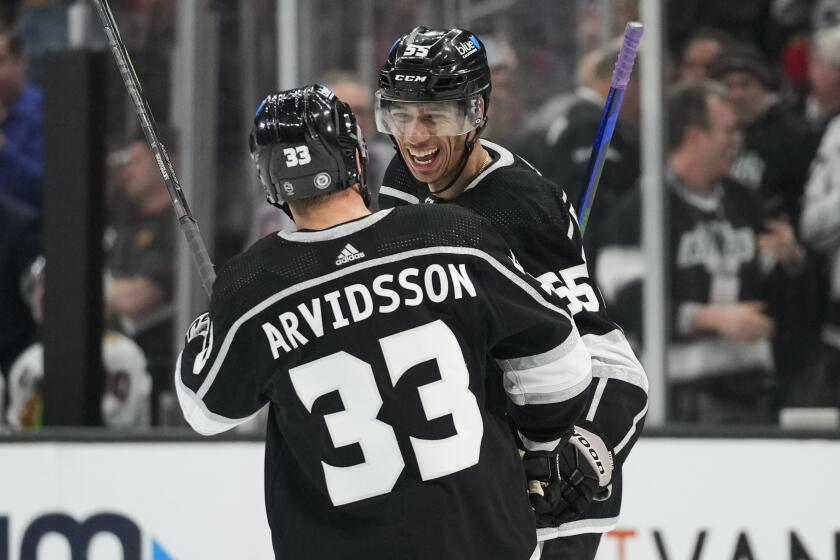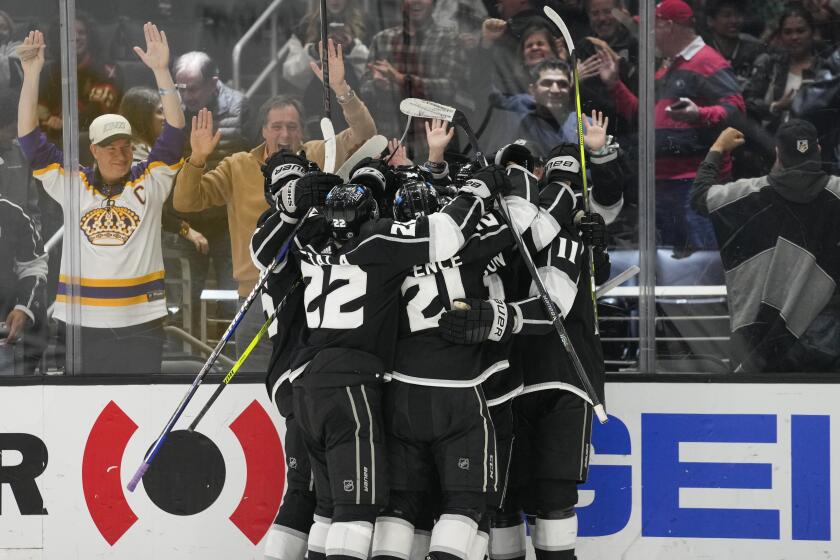Lawsuit could give college athletes cut of NCAA deals
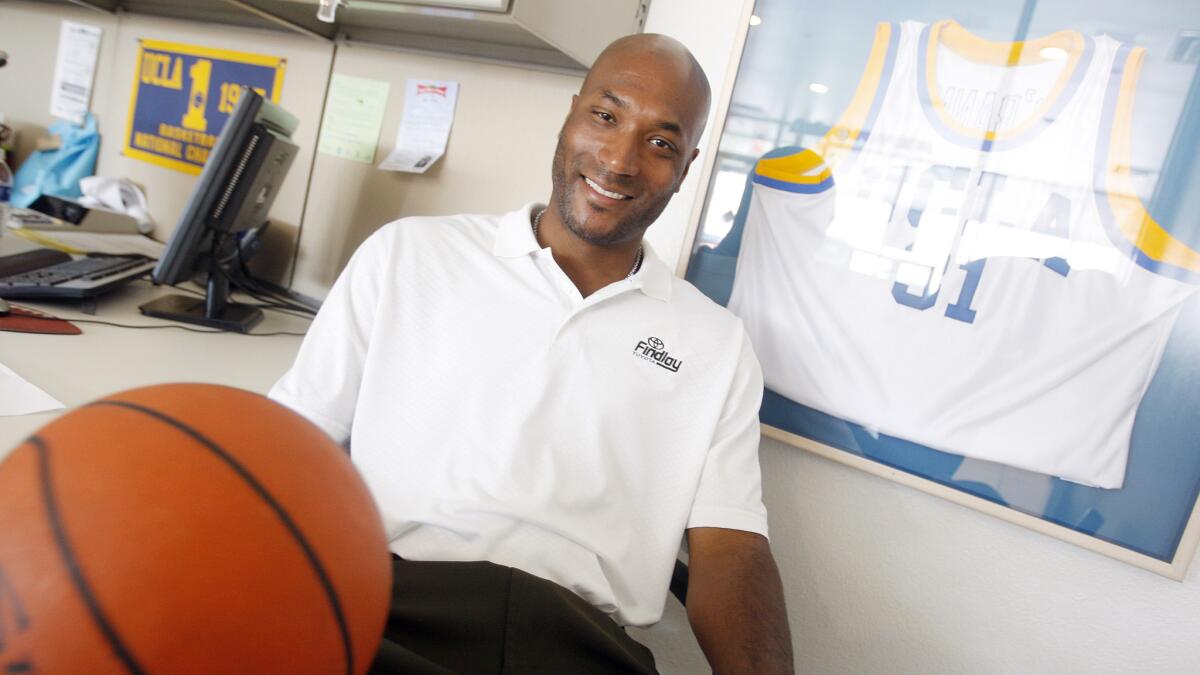
The NCAA and its member schools have preached a vision of amateurism whereby young men and women play for the love of the game, not money.
That concept will be put on trial in an Oakland courtroom this week.
A class-action antitrust suit led by former UCLA basketball star Ed O’Bannon argues that some student athletes should receive more than just scholarships in what has become a multibillion-dollar industry.
Former and current players want a share of the lucrative television contracts and video-game endorsement deals the NCAA generates by using their names, images and likenesses.
But money is only part of the equation in O’Bannon vs. NCAA, which is scheduled to begin Monday in federal court before Chief District Judge Claudia Wilken and should last two to three weeks.
“The NCAA wants to protect this fiction of the noble athlete,” said Orin Starn, a Duke professor who studies the culture of athletics. “This has the potential to be a landmark moment in the way we view college sports.”
The case dates back nearly five years to when O’Bannon, who had been a Bruins star in the early 1990s, noticed a kid playing a video game. One of the animated figures on the screen looked like O’Bannon.
“I thought that was wrong,” the former player previously said. “I thought that a change needed to be made.”
Although some of the most popular college sport video games— produced by Electronic Arts — do not include the names or faces of famous athletes, they do feature the same jersey numbers and recognizable physical attributes.
The 2011 version of “NCAA Football,” for example, has a USC quarterback wearing No. 7, just like Matt Barkley that season. Its Louisiana State quarterback wears No. 9, just like Jordan Jefferson.
O’Bannon’s legal challenge evolved over the years, adding plaintiffs and bringing television into the mix.
Video game revenues for the NCAA have been estimated at less than $10 million annually, but broadcast rights have skyrocketed. CBS Sports and Turner Broadcasting paid more than $10.8 billion to secure the men’s basketball tournament through 2024. The Pac-12 Conference has a deal with Fox and ESPN for about $3 billion.
Only star players in football and men’s basketball would receive significant money if O’Bannon wins, say experts, who add that revenue sharing isn’t likely to sink Division I athletic programs.
“When you add up everything, it’s not that much,” said Rod Fort, co-director of the Michigan Center for Sports Management. “Maybe college football players won’t have nine-speed Jacuzzis any more. They’ll only have six-speed Jacuzzis.”
EA Sports recently agreed to a $40-million settlement with 100,000 current and former athletes. The payments will reportedly range from $48 to $951 per season for players included in video games dating back to 2003.
The O’Bannon plaintiffs recently dropped their demand for individual damages; they want only to compel a rule change.
Under current regulations, student-athletes must sign a waiver that grants the NCAA, conferences and schools permission to use their names, images and likenesses. The O’Bannon plaintiffs portray this as a violation of antitrust law.
NCAA lawyers characterize the system as essential for several reasons.
Though college sports has been rife with corruption — boosters paying star players, agents sneaking cash to athletes — the NCAA says the aura of amateurism distinguishes its product from professional leagues and attracts fans.
The rules also promote competitive balance, preventing rich schools — the ones with the most star players — from buying up even more than their current share of the best high school talent, the NCAA says.
“We are prepared for trial and look forward to presenting our case to the judge next week,” Donald Remy, the NCAA’s chief legal officer, said in a statement.
If O’Bannon wins, athletes might soon be allowed to receive money from agents and get paid to sign autographs. To avoid paying current players, the plaintiffs say, the NCAA could establish a trust fund and hold the money until they leave college.
“I could see this as being the first crack in the traditional foundation of amateurism in college sports,” said Matt Mitten, director of the National Sports Law Institute at Marquette University.
If the NCAA wins, it would preserve the status quo, but not necessarily forever.
Other lawsuits have focused on video-game revenues and enlarging scholarships to address costs beyond tuition, room, board and books. Football players at Northwestern have begun an effort to unionize, seeking larger scholarships and better medical care.
Experts see these efforts as proof of momentum building toward change.
O’Bannon will provide the first legal test. NCAA President Mark Emmert and Big Ten Conference Commissioner Jim Delany are expected to testify.
Though Duke professor Starn suspects this case could narrow the perceived gap between college and pro sports, he doubts it would harm the NCAA’s popularity.
“I don’t think anything can get in the way of the American sports fan and his Saturday football game or office basketball pool,” he said. “We’ll still want to pack the stands and root for the Buckeyes or the Trojans.”
More to Read
Get our high school sports newsletter
Prep Rally is devoted to the SoCal high school sports experience, bringing you scores, stories and a behind-the-scenes look at what makes prep sports so popular.
You may occasionally receive promotional content from the Los Angeles Times.

